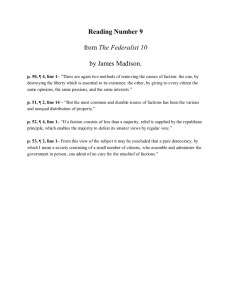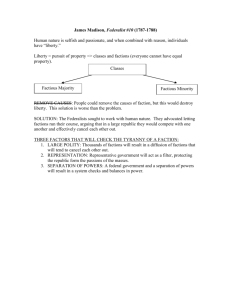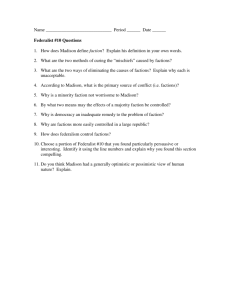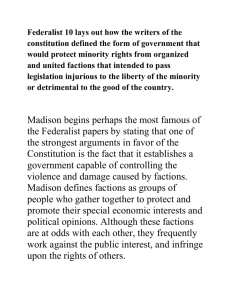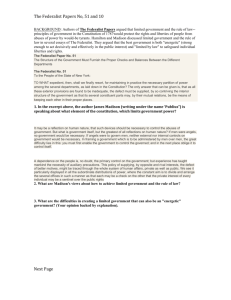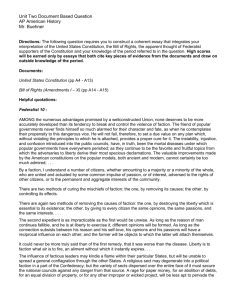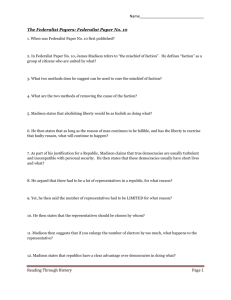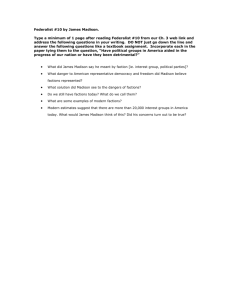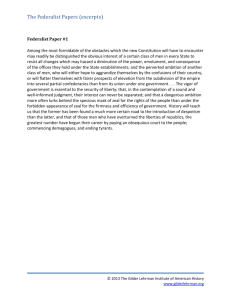The Federalist Papers
advertisement
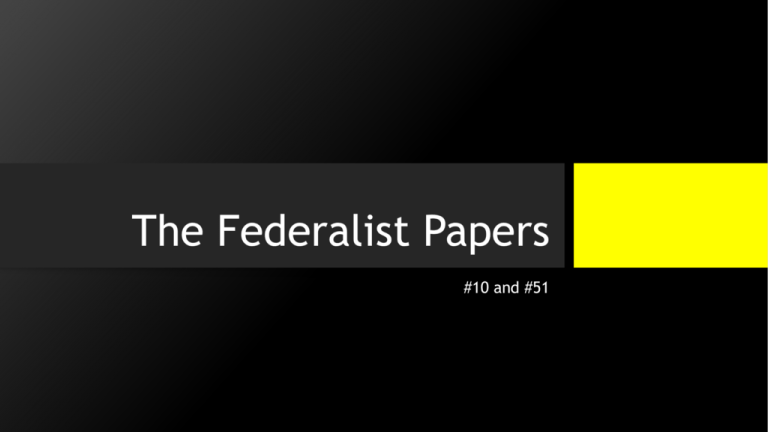
The Federalist Papers #10 and #51 The Fundamental Question How do we create a government that protects liberty, achieves justice, ensures stability, and promotes the public good? Authoritarian Governments: Do not protect liberty Pure Democracies: Do not protect liberty of the minority Unitary Governments: Trample on liberty (Britain) Confederate Governments: Do not ensure stability The Federalist Papers 1. Written by Alexander Hamilton, James Madison and John Jay under pen name Publius (Latin word for public). 2. A series of letters published in newspapers 3. Written for three reasons: A. To influence the vote in favor of ratification B. To explain the Constitution for future interpretation C. Outlined how the Constitution should be set up 4. Included 85 letters published from October 1787 to April 1788 and later bound in book form. The Federalist Papers 5. Arguments made by The Federalist Papers A. Federalists 1-14 stressed importance of the Union B. Federalists’ 15-22 stressed inadequacy of the Articles of confederation C. Federalists 23-36 Explained arguments for the Type of Government Contained in the Constitution D. Federalists 37-51 Explained the Republican Form of Government E. Federalists 52-83 explained the 3 branches of government. F. Federalists 84-85 answers questions of objections to the Constitution Federalist #10 The largest danger to liberty is FACTIONS (groups with a shared interest that is “adverse to the rights of other citizens”) There are two ways of controlling the effects of factions… 1.Remove the cause of factions 2. Control the effects of factions Removing the Causes of a Faction... Destroy Liberty • Liberty essential to the founding of factions • Liberty: Faction:: Air: Fire • Would it make sense to get rid of Air to make sure we never had fire? • The cure is worse than the disease Give Everybody the Same Interests • Man’s reason is not perfect • As long as Man has the liberty to use his reason then different opinions will form • Connection between reason and his “selflove” (self-interest) • Factions are natural • Impractical • Rejection of Aristotle’s View Controlling the Effects of a Faction... If the faction makes up a minority of the population… The Republican Form of Government prevents it from putting its policies into practice Controlling the Effects of a Faction - If the faction makes up the majority of the population than the government must find a way to “secure the public good and private rights” and also to “preserve the spirit and the form of popular government” - Prevent the majority from having the same interest at the same time - Make it impossible for the majority to carry into effect their “schemes of oppression.” How Do We Prevent a Majority Faction? Will a Pure Democracy work? • A pure democracy: a small number of citizens assemble and administer government in person No. In such a system there is no check on the will of the majority How Do We Prevent a Majority Faction? Will a Republic work? • A republic is a form of government in which a “scheme of representation” takes place. Yes, because the representative system “refines” the public view. Should the Republic be Small or Big? Small Republic Large Republic Unworthy Candidates Unworthy Candidates With a smaller number of voters it will be easier for a candidate of less ability or “bad” intentions to gain the votes needed to win a position # of Factions (Interests) In a small homogenous group you are more likely to have less points of view and more common interests, increasing the chance of a harmful faction. With a larger number of voters it will be harder for an unworthy candidate to fool the larger group into voting for them. # of Factions (Interests) In a large group you are more likely to have a greater number of points of view and interests, making it harder for one faction to gain a majority of the votes. So in Conclusion…. Contrary to Popular Belief… SIZE DOES MATTER!!! (sorry Camero) According to Madison, liberty is best protected in a large scale republic, where there are more voters and more interests to check each other. Federalist #51 • Federalist #10 argued that large districts help to check the mischief of a faction. • But elected officials will be passionate, biased, ambitious – they will sometimes pursue their passions at the expense of the public good. “The Structure of the Government Must Furnish the Proper Checks and Balances Between the Different Departments” • Probably written by Madison, though some believe it is by Hamilton. Federalist #51 • Like Federalist #10, a concern for minority rights: "In a free government the security for civil rights must be the same as that for religious rights.” • “Justice is the end of government.” Federalist #51 • Many Founders had a Pessimistic view of human nature: • “If men were angels, no government would be necessary. If angels were to govern men, neither external nor internal controls on government would be necessary.” Federalist #51 How can we design government to further check the power of factions and the danger of self-love? • Government should be designed to take advantage of “self love” and ambition. • Use human weakness as an asset. “The constant aim is to divide and arrange the several offices in such a manner as that each be a check o the other – that the private interest of every individual may be a sentinel over the public rights.” Federalist #51 • Solution #1: Separation of powers: • Limited interaction of those selecting members of each branch • Economic and political independence of each branch • Solution #2: Federalism: • “The power surrendered by the people is first divided between two distinct governments” • A “compound republic” leads to dual allegiance and double protection. Federalist #10 & #51: Lay out the Solutions • The new Constitution: • Creates a large republic, that dilutes the power of factions and promotes moderation. • Creates a system of checks and balances that make human weakness an asset: • Divide power between states and federal government. • Separate powers within both governments.
